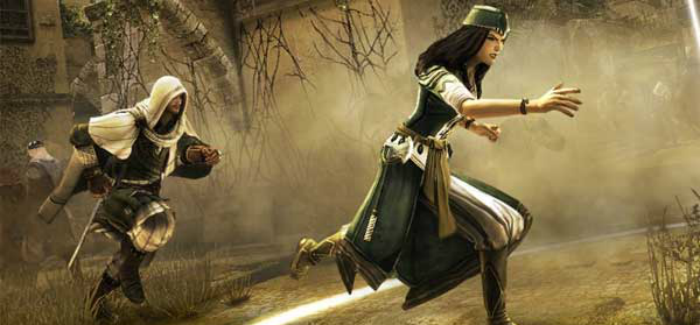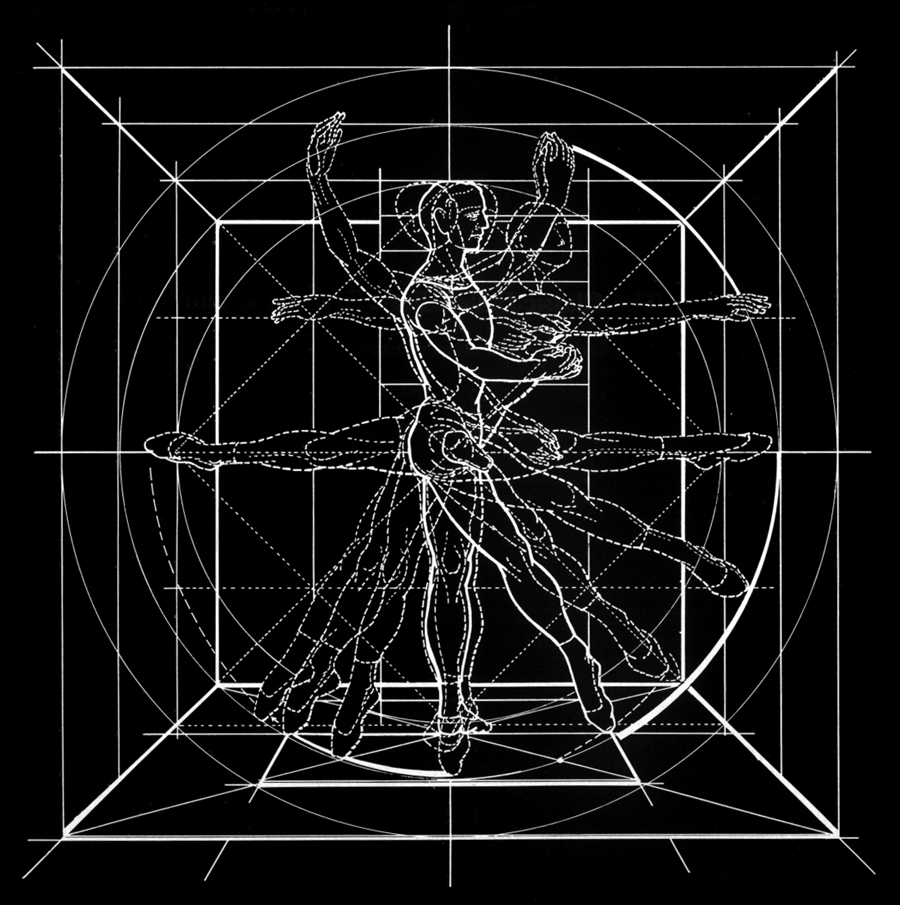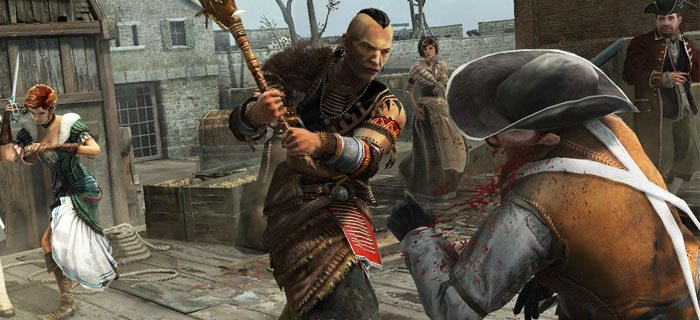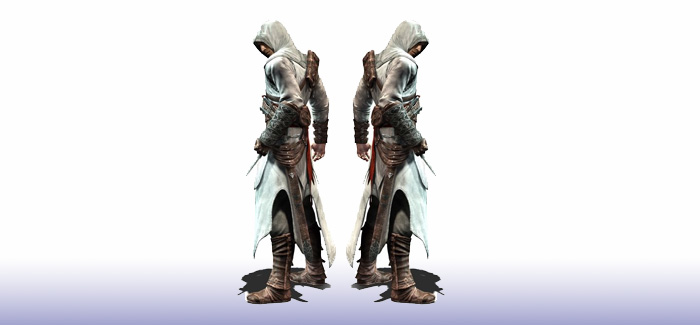


With so many skills to choose from, it’s not easy to select your assassination arsenal in AC3 multiplayer gameplay.
That’s why this article covers an extensive range of strategy recommendations for every multiplayer ability in Assassin’s Creed 3, just like I did with my Brotherhood abilities guides and my Assassin’s Creed Revelations crafting guide.
This article is subject to change, and will be updated in the coming days and weeks with perks, streaks, and crafting recommendations. Until then, feel free to comment below with your own tactics and ability preferences!
Looking for a simpler solution to AC3’s myriad threats? Animus Shield makes your temporarily invulnerable to most abilities, including Smoke Bomb and all ranged weaponry. Your character will be enveloped in a (visible) barrier that completely negates up to three enemy abilities, leaving you free to capitalize on their surprise. Note that this skill only works to prevent effects, and can’t be used to cancel anything that’s already been fired at you.
Animus Shield is one of the biggest game-changers of Assassin’s Creed 3 multiplayer. Since so many players rely on luring others into Throwing Knives, Tripwire Bombs, Firecrackers, and the like, gaining temporary immunity to these abilities is incredibly powerful. Not only can you waltz into otherwise dangerous scenarios, you’ll often also force your foes to fire off their skills, unwittingly wasting them. It’s basically like an inward-facing Mute that negates last-ditch defensive strategies.
Animus Shield can also be used to counter Pistol, Poison Dart, and Disruption on reaction. Hear someone aiming at you? Activate your Shield and you’ll be invincible to all manner of projectiles. Most players won’t be able to cancel their shot in time, giving you a large window to stroll up and slap them in the face.
Crafting recommendations: For Animus Shield, both duration and cooldown are good bets. A slightly longer lasting barrier will give you more wiggle room, and lower cooldown means you can troll your opposition more frequently. Increasing Shield charges, however, is largely a waste, since blocking multiple attacks will rarely be a factor.
Whether or not you resemble Whitney Houston, the ability Bodyguard will enlist an NPC in proximity to protect you from would-be killers. If the NPC was not already a copy of your persona, it will temporarily disguise as you for Bodyguard’s duration. As your assassin approaches, the Bodyguard will walk directly up to him or her and attempt a stun. If it works, your killer’s contract will be reset, giving you a chance to flee or plan your next move.
As with Decoy (below), Bodyguard won’t fool players who have already identified you, so it’s best activated when you think your pursuer(s) are still clueless or lingering out of sight. Bodyguard also has a very limited range and duration, so successful timing is strict. That said, its cooldown is relatively short, so it’s usually better to lean towards activating it earlier and hoping for the best.
Because there is no longer a dedicated stun button, Bodyguards cannot be as easily dispatched as they were in Revelations, making them significantly more useful even when the ploy is obvious. Your opponent will have to play around the Bodyguard or wait it out, giving you an opportunity to stun or run.
Crafting recommendations: Now that Bodyguards are so powerful, it’s easy to get benefit from almost any crafting combination. If you’re happy with the as-is power of the skill, drop two points into cooldown to ensure your security agent is always available. If not, boosting duration is the best way to make your stun-happy buddy a more formidable defensive tool.
Closure won’t heal your emotional wounds, but neither will it prevent too many physical ones. When activated, this ability seals off every Chase Breaker in a large radius, preventing everyone (including yourself and allies) from using them as shortcuts. These Chase Breakers will remain closed for a significant period past their normal recharge times, locking down chasers and chasees for its duration.
Commonly cited as the worst skill in Revelations, Closure hasn’t seen significant tweaks that would make it worth your while in Assassin’s Creed 3. Since relatively few encounters actually end in chases, the opportunity to cheat at them is fairly narrow. Even if you do lock down all the Chase Breakers, your enemies can still climb over/around them with minor penalty. Hell, some chases won’t even take place around Chase Breakers, further limiting what this ability can do for you and your score.
For these reasons, there really is no situation that calls for Closure. Leave it off your checklist of unlocks and pick something else.
Crafting recommendations: No amount of Abstergo credits will ever make Closure a good skill, so don’t waste your time. If you absolutely must spend the points, double cooldown means you can waste your ability slot more times per match!
When activated, Decoy causes one nearby NPC to manically flee from your location towards the selected locked character. If the NPC was not already a copy of your persona, it temporarily disguises as you as it makes its mad dash. Decoy is on a relatively low timer, making it a frequent (though increasingly more predictable) distraction. Decoy behavior can be crafted to different levels of subtlety, which may throw off enemies that have grown accustomed to the default Decoy AI.
For best results, players should consider running off simultaneously with their Decoy’s launch. Since Decoys innately trigger the quick-lock indicator of your pursuer(s), this will force your killers to flip a coin on which copy to chase and murder. Note that Decoy is completely useless if your opponent has already spotted you, so try to activate it from a dense crowd or when you suspect your pursuer is about to round the corner.
Unlike in Brotherhood, Decoy cannot be used offensively to identify targets. That said, its low cooldown means you can use it at almost any time, even if it’s just in the hopes that a crazed NPC will distract or unnerve other players, possibly enough to force a bad play.
Crafting recommendations: Decoy only works on players who aren’t paying complete attention to you, so the behavior crafting option is largely wasted. If Decoy wasn’t gonna work with stock behavior, it probably wouldn’t work with modified behavior. For that reason, duration and cooldown are better places to spend your points, either split or with both crafts in cooldown. Double duration is largely a waste, as a Decoy’s efficacy drops off the longer it’s alive.
A perennial favorite from Ubisoft, Disguise changes your persona’s appearance for a few seconds, throwing off aggressors who are attempting to weed you out of the crowd. The initial animation is a quick (but obvious) flash, and the ending animation is a significantly more conspicuous flickering countdown. In other words, being spotted at the begging or ending of the ability’s duration means you’re taking a dirt nap really soon.
Disguise is primarily useful as a defensive tool, though it’s not a flawless one. Your pursuers may not be able to identify you by appearance, but their proximity and line of sight indicators will still function just fine. If you’re the only character on the map and their HUD is lit up like stoners on 4/20, you’ll get snuffed out quickly. Try to activate Disguise from within blend groups, making it harder for your killers to spot your transformation or pick you out from he crowd. Discretion could also help net you a stun or focus stun.
Disguise does have uses on offense, particularly if your quarry knows who you are (either by direct observation or during team play). It’s also useful as a failsafe in free-for-all modes like Wanted or Deathmatch: activate Disguise a few seconds before killing your own target. This will reduce the chances your pursuers will interrupt your hugely important assassination. You’ll lose your disguise after the kill, but it’s better than losing your life beforehand.
Crafting recommendations: No matter how good you are, getting caught with Disguise wearing off is a fatal mistake. Instead of opting to minimize its effect, just put your points into duration. You’ll get more time unexposed, as well as more time to find a place to hide as Disguise wears off. This ability’s cooldown is already fairly low, so cutting it further is largely overkill.
Disruption does as Disruption sounds. When used, it agitates your target’s user interface, crippling their situational awareness. Their targeting and other HUD elements will be scrambled, and they’ll have a generally unpleasant experience identifying targets and evading pursuers. With the latest patch, Disruption also drops your target’s ability to lock-on to targets.
As a ranged ability, Disruption is the last revealing of your options. It’s not as loud or flashy as the Pistol, and using it doesn’t force you into immediate action like Throwing Knives do. As such, Disruption is a strong choice for stealthy play. You can use it from blend groups when your killer is closing in (but hasn’t actually identified you yet), or on your victim to disorient her right before you land a lethal blow.
Of course, Disruption doesn’t actually prevent your opponent from harming you, it just makes it harder for her to succeed in doing so. But if you like meddling with other players’ minds and toying with your prey, no other ranged slot skill offers a similar perk. Disruption is better in free-for-all modes than it is in team play, if only because disabling a single player has less value when there are four people simultaneously hunting you down.
Crafting recommendations: Since Disruption is so situational, making it work right is more important than making it work frequently. To that end, dropping two points into duration will greatly increase the ability’s annoyance, messing up your target’s HUD for ten whole seconds. If that’s not enough time to make a big play, I don’t know what is!
When used, Firecrackers send NPCs into a state of shock, leaving them quivering on the floor. Actual players aren’t stunned, but are instead blinded – their screen is emblazoned white, much as with a flashbang grenade in modern times. This effect allows you to single out players from a crowd and decrease the chances they’ll be able to make an effective escape.
Firecrackers is most frequently used on offense, as it instantly identifies and debilitates multiple targets in its range. Dropping or throwing it is too fast to react to in most circumstances. Hell, some players will assume you’re throwing a Smoke Bomb and they’ll waste their own in response. Everyone responds to getting blinded differently, with some players scrambling into walls, others deploying defensive abilities, and yet others standing still (this doesn’t work).
Firecrackers is less helpful on defense, but throwing it at an approaching aggressor can disorient her long enough to make your escape, especially if she isn’t already within kill range. Keep in mind Firecrackers removes the user interface and the sync-locks of enemies, making it an interesting (though situational) tool in Assassinate. In some circumstances, you can use it to reverse the pursuer/target dynamic, netting a surprise kill on your would-be predator.
Crafting recommendations: Because you can throw Firecrackers, there’s really no point to extending this ability’s range. And since Firecracker’s primary effect (identification) is instant, duration isn’t a big deal either. Instead, focus on boosting cooldown so you’ll always have the option to turn every fight into the 4th of July.
By activating Glimmer, your persona essentially disappears. For a few seconds, you become almost invisible, appearing as a faint, glimmering phantasm. The more slowly you move, the more invisible you remain, with opacity increasing alongside your speed. Once you’ve performed a kill or stun (or your timer runs out), you’ll be rendered opaque once more. If you ever needed to make an impossible escape or get the jump on an otherwise prepared opponent, try this.
Glimmer is the perfect skill to employ in a variety of situations. You can win chases by rounding a corner, becoming transparent, and letting your pursuer either run by or take a stun to the back of the skull. On offense, you can more easily sneak up to an isolated opponent and build up your Approach meter, making for a better score. In team play, Glimmer will sometimes allow you to fool your foes into thinking they’ve got your group outnumbered.
Similar to Decoy and Disguise, the more you use Glimmer, the less powerful it becomes. Your quarry will slowly start to expect it, looking around more carefully for hints of a nearly invisible predator. For this reason, don’t expect Glimmer to win you entire rounds. Mix it with other situational diversions for maximum rage-inducing effect.
Crafting recommendations: Just like Disguise, Glimmer’s primary limitation is its duration. Getting caught in the open while your Glimmer wears off is a deadly proposition in most circumstances. Dropping your crafting points into duration will give you more time to set up sneaky assassinations or evade pursuers.
While it sounds like something out of Monday Night Combat, the Money Bomb skill in AC3 has 100% fewer cheerleaders involved. Instead, your character hurls a purseful of coins to the ground, attracting NPCs to the area. They’ll scramble to the glittering gold and drop to their knees to pick it up, revealing real players for their lack of greed.
The most obvious use of Money Bomb is to weed out otherwise inscrutable blenders from within a crowd. Money Bomb’s area of effect is larger than it appears, so there is usually little ambiguity once the dinero has been launched. And, speaking of lauching, Money Bomb can be aimed and thrown, letting you detect other players from a significant distance, just like Firecrackers. Unlike the latter ability though, your opponents won’t be blinded, so they’re free to run for their lives unhindered.
On the note of sprinting to safety, Money Bomb does have a defensive use: dropping one while being chased will cause AI characters to clutter up the area behind you, making it harder for pursuers to catch up. It’s been done in campy action movies before, so you know it works in a video game! Technically, you could also throw your cash at chase breakers or hallways right before a kill in the hopes of blocking off escape routes, but your results may vary.*
Abstergo knows it’s not easy making friends, so Morph makes them for you. Activating this ability transforms a handful of NPCs in your immediate vicinity into replicas of your persona. It can now also be held down, triggering Morph at around a locked, selected area instead of at your current location. Morph doesn’t end on a timer, meaning you can pop it early and rest easy for a few minutes if desired. But unlike previous games, this change only lasts as long as you do, so once you bite the dust your clone army will revert to their original appearances.
Morph is a simple, but effective skill, since it makes your pursuers’ job of murdering you significantly harder. If you remain blended in a group with your lookalikes, opponents will have to use an ability of their own (Firecrackers, Money Bomb, etc.) or spend a lot more time to figure out which you is the real you. This advantage can help you discover who your hunters are and, in FFA modes, the confusion can often lead to your killer revealing himself to his own assassin.
As for offense, Morph has one quirky, janky use: activating it in a crowd with your target will usually transform everyone except your now-exposed prey. This trick works much better in AC3 than it did in Revelations, since you can trigger Morph from a distance. In addition, hiding in the same blend group as your target doesn’t give that player a stun prompt any more, either. By the time your victim realizes what has happened, she’ll have no option but to charge away blindly or attempt a contested kill. Either way, you have the advantage.
Crafting recommendations: As with previous versions of Morph, you’re best served by allocating crafts to duplicates. Having more copies decreases the odds a pursuer will correctly guess the real you, whereas increased range just makes up for bad skill aiming. Since Morph has unlimited duration, it’s not really necessary to drop its cooldown, either.
Having evolved from a covert, one-of Renaissance invention to an everyday (if slow-loading) firearm, the Pistol is one of Assassin’s Creed’s most controversial (but tactically necessary) weapons. When fired, it instantly kills the designated target from any range, provided it hits. Pistol accuracy is atrocious at base, but rises to 100% if charged completely. Crafting can increase accuracy and reduce charge time by large margins.
As far as ranged abilities go, the Pistol is the most blunt instrument available. Using it will instantly make you conspicuous (as your persona performs a unique aiming animation and your target receives an audible warning), so its value is limited to gunning down targets that are unconventionally troublesome. Prey who run or flee to the roofs at the first indication of Whispers can be quickly dispatched. Likewise, the Pistol is a strong deterrent when you know a defending player is attempting to lure you into a Tripwire Bomb or other localized threat.
Unlike Brotherhood and Revelations, Assassin’s Creed 3, the Pistol does not fight most other skills for an ability slot, making it a strong backup choice in most game modes. Since it has no effect on pursuers, it is a purely offensive weapon, though it can protect you by thinning defender ranks before moving in or eliminating a lingering threat in Assassination before he/she can disrupt your plans. Also note: the Pistol can confer two exclusive kill bonuses, so it can help you earn Variety more quickly than other ranged options.
Crafting recommendations: As with Disruption, the Pistol is not a skill you’ll be using constantly, but one that must function perfectly when needed. So instead of reducing cooldown, put your crafting points towards reducing focus/aiming time. This will greatly reduce the time your target has to react to your lock, and will give you the added bonus of accuracy, making that crafting stat redundant.
If you’re a fan of subtlety, this is the ability for you. If activated in touch range, your character will nonchalantly slip something toxic to your target, leaving them to croak a few seconds later. In addition to slaying the sucker without alerting him, you’ll also earn a significant Poison score bonus that counts towards your action Variety. If you accidentally target an NPC, it will instantly die and you’ll have wasted your ability.
Poison is a long time favorite of stealth-minded Assassin’s Creed players, since it provides huge rewards for the risks it entails. What are those risks? First, if another player kills your target before Poison finishes its effect, you’ll only get a 50 point Intercepted bonus… much lower than even a Reckless kill. Second, Poison’s range requires you to physically touch your target, meaning you are well within stun range before you’re in arsenic range. If you give yourself away to your victim in any way, expect to get punched in the face. Third, Poison is an offense-only ability, meaning that just by taking it, you’re more vulnerable to your own pursuers.
Of course, once your prey is Poisoned, she can no longer stun you or do anything other than wait for death. In the ideal scenario, you’d approach your target from a blend group with full Incognito, track her for a Focus bonus, then slip her the vial of Poison and disappear without her or anyone else being the wiser. Such a kill would be worth around 1000 points, depending on your crafting and Variety tally – if that’s not an argument for Poison, I don’t know what is!
Crafting recommendations: Noobs will flock to delay reduction to cut down on interceptions, but it’s by far the worst crafting choice. Score bonus boosting is mathematically the greatest return on investment, granting large point gains over the course of a match. Cooldown reduction offers more scoring opportunities, at a lower value. If in doubt, just stick with increasing your bonus.
Whereas most ranged abilities are utility spots designed to delay and disrupt, Poison Dart plays a more traditional, murderous role. Activated like the Pistol (but with a drastically reduced range of a few meters), Poison Dart infects your victim just as Poison does, without the risk of germs you’d get from directly touching them. Once your enemy drops dead, you’ll receive a hefty boost to your score.
Why use Poison Dart when Poison exists? Well, it’s obviously less risky in some scenarios. It can be used from various heights to score a kill, or simply at range to reduce the odds of getting stunned. Of course Poison Dart has its disadvantages as well: your prey will be warned of your intent, and your persona will enact a tell-tale aiming animation. Thus, Poison Dart provides some of the score value of Poison but none of the actual stealth.
To that effect, Poison Dart’s uses are actually somewhat limited. Its range is inferior to Pistol, it can’t be used defensively like Throwing Knives, and the cooldown is prohibitive. Ultimately, it is most likely to find a home in Deathmatch and Assassinate. In DM, targets do not have a large area in which to flee, negating some of Poison Dart’s problems. In Assassinate, Poison Dart will be perfect for opportunistic kills when encountering two or more players already engaged in combat. Of course, it’s always possible the meta will shift, but as long as these modes gravitate towards death orgies, ranged poison application will have minor value.
Crafting recommendations: While increasing range is tempting, slashing the ability’s cooldown is a better investment, since Poison Dart will then yield more points over the course of a match. You’ll get your poison delivered faster and/or more frequently, as long as you’re skilled enough to position yourself well. The poison delay will rarely change the outcome of your death-dealing, so don’t bother with it.
The best skill in Assassin’s Creed multiplayer since Brotherhood, Smoke Bomb makes a return with minor tweaks. When used, the ability creates a puff of choking gas at your feet (or where targeted, if thrown) that prevents NPCs and players from moving, acting, or using abilities. As such, it can be used to disable attackers, keep targets in place, or create impassable routes to win chases.
Smoke Bomb’s reputation for being unbalanced is due to its omnipotence against so many strategies. It prevents retaliation of any kind on offense or defense, so an unprepared enemy is helpless to your blade/fist/abilities. It now acts faster as well, removing the infamous “lag” associated with the skill in the past, so users will get a more responsive feeling whenever they decide to hold an impromptu fire drill.
Of course, nothing comes without a price, and Smoke Bomb has finally received some nerfs to balance its impressive power. In addition to the longest cooldown in the game, Smoke Bomb has also been hindered by the addition of abilities (like Wipe) that directly counteract it. And since users don’t receive a stun prompt from pursuers anymore, Smoke can’t be used as easily to disable and discern attackers from amidst a crowd. This means players will be able to use Smoke Bomb less often and with a lower success rate than ever before. It’s still a solid ability choice, but it’s no longer an auto-pick insta-win option.
Crafting recommendations: In previous iterations, Smoke Bomb’s relatively short cooldown meant successive cooldown crafts drastically increased uses per match. Now that Smoke Bomb starts at 100 seconds, the advantage is less striking. Ultimately, there’s no wrong way to craft this ability, but I’d recommend at least one point in duration. A longer-lingering cloud ensures you have more time to escape, stun, kill, or ID your hapless victims.
Whether you construe bamf to mean “badass motherfucker” or “the sound Nightcrawler makes,” both are apt descriptions of what Teleport does. With the push of a button and a beam-up animation reminiscent of Star Trek, your persona is instantly whisked to a location several dozen meters away (depending on your crafting choices). The exact destination is not precise, but you can aim for a general area with your reticule.
Teleport has a long wind-up time and a long recharge, so its activation must always be carefully calculated. Your persona will give off an unmistakeably bright flash that will also render you immobile during the animation, so use chase breakers and walls to hide your interdimensional intent for as long as possible. Since Teleport is far from a favorite skill, it will catch many players off guard. If you’re able to lure two or more pursuers into a chase on the rooftops and can get a middling lead, a Teleport all but guarantees a Multiple Escape. Do keep in mind that Teleport can be interrupted by abilities like Throwing Knives, Smoke Bomb, and Wipe, as well as by your evisceration.
While most players opt for Teleport in Artifact Assault or Domination, where specific territories are important, the skill serves a purpose in Wanted as well. By leading your pursuer towards the edge of the map, then Teleporting towards the middle, you are likely to put your killer’s killer (AKA your grandkiller) between the you and your pursuer. Not only will your former predator be confused, he’ll also probably be dead in a matter of seconds.
Crafting recommendations: Another narrow but powerful skill, Teleport functions best as a Get Out of Jail Free Card when it can deliver you from danger quickly. Put both points into activation time reduction to guarantee that, when shit gets hairy, you won’t be around to see it. Crafting for duration or cooldown will often result in your untimely death as you’re beaten bloody just milliseconds before Scotty could beam you up.
Now a sidegraded ranged ability, Throwing Knives remains one of the most versatile and indispensable options in Assassin’s Creed multiplayer. When thrown, these piercing projectiles slow your target (killer or victim) and prevent her from all high-profile actions, including climbing. Throwing Knives also reduce your victim’s action range, meaning you can kill or stun her from maximum range without fear of a Contested Kill/Honorable Death.
At once obvious, Throwing Knives have more uses than any other skill in the game. They can be used to end chases on either end by crippling your opponent. Throwing Knives can knock roofers off balance, sending them helplessly tumbling to terra firma. By slowing your prey, you can set up otherwise difficult acrobatic kills or ledge grabs, not to mention bide your time long enough for a greater Approach bonus. If chucked at the right time, these blades can interrupt abilities with activation times, such as Teleport and Pistol.
New to AC3, Throwing Knives produce the same audible warning all ranged weapons share, so make your shot count. Keep in mind that, unlike the Pistol, Throwing Knives are not hitscan (instant) when used, and can miss at long range due to shifting obstructions. This ability also received a longer cooldown than in the past, owing in no small part its incredible flexibility.
Crafting recommendations: I’ve said it before and I’ll say it again: don’t put any points into Throwing Knives’ speed reduction. Since this ability disables high profile/notorious movement, the base crippling effect is significantly more powerful than the 30% listed on-screen. As such, you’re much better off investing in lengthening the crippling effect (my preference) or boosting the Knives’ cooldown.
With a flick of the wrist and the (only audible to you) crank of a timer, your persona lays down a nearly invisible trap. If any non-allied player character (including FFA players who aren’t actually hostile to you) walks into its sphere of influence, the trap is sprung, engulfing your opponent in a localized smoke bomb. Like Smoke Bomb, Tripwire Bomb can be thrown, but its effect is always delayed, so planning and entrapment are necessary for success.
Tripwire Bomb works best when you have a reason to be standing your ground. In Domination, Artifact Assault, and Manhunt, for instance, you and your team profit immensely from controlling areas of the map. In modes like Wanted or Assassinate, Tripwire Bomb is basically useless – you need to move too frequently to ever benefit from having a static safe haven. The actual effect of the ability is not as strong as that of Smoke Bomb, so its primary benefit is trapping specific areas, deterring aggression, and trolling enemies with randomly-strewn minefields in Assassinate.
Tripwire Bombs are actually visible on the ground, depending on the terrain, and can be intentionally sprung by slow-walking just outside their range. They also don’t protect you from aerial assassinations, ledge grabs, or other Z-axis based bludgeonings. For these reasons, Tripwire Bomb is generally limited to area denial in team play.
Crafting recommendations: Like Morph, Tripwire Bomb is a fairly static ability that relies on subterfuge and spacing more than timing. So don’t worry about the wind-up time or cooldown for your favorite little minefield. Increase the bomb’s explosive range to ensure your quarry is ensnared when the piège is actually sprung. After all, there’s nothing more infuriating than watching your Tripwire Bomb blow up and miss your pursuer by an inch.
Wipe takes its name not from post-fecal hygiene, but from tabula rasa, the blank slate. When fired off, Wipe will prevent nearby opponents from using abilities, guaranteeing they can’t retaliate with Smoke Bombs, Bodyguards, and the like. Wipe also clears their audio channel of those pesky Whispers and Heartbeats, so if they haven’t already figured out how close you are, they’re going to be in the dark until your blade finds their hearts. I guess technically they’ll be in a different sort of dark at that point.
Wipe is (fairly) likened to Mute from Brotherhood and Revelations, though it has a few key differences. Unlike Mute, Wipe’s ability-canceling effect is more than a fraction of a second long. In fact, it can last quite a few seconds when crafted for duration. Of course, Mute also cancelled your enemy’s capacity to kill or stun you, which Wipe doesn’t assure. In other words, Wipe trades versatility for ease of use. This seems like a fair change, given how susceptible Mute was to latency issues in previous games.
Wipe is not a particularly low-key ability, so only use it in the final moments before making your big move. Most players will respond to Wipe with some kind of desperate, high-profile action, and if you’re not prepared to address it, you’re likely to see your prey scoot off or your pursuer rush in for a life-ending strike. Use Wipe at medium range, right before you’d expect a bomb of some sort, then humiliate your impotent victim.
Crafting recommendations: Unlike Mute, Wipe’s range expansion isn’t really generous enough to warrant a lot of investment. Instead, focus on supplementing the ability’s duration to cancel your foes’ capacities for longer periods of time. You’ll have a larger margin for error in FFA modes, and more protection for your teammates when playing cooperatively.
* Read: If you can pull this off, you are a goddamn legend.




 Assassins Creed 3 multiplayer strategy guide and tips
Assassins Creed 3 multiplayer strategy guide and tips Top Tier Tips: Advice from WiNGSPANTT and Top Tier Tactics
Top Tier Tips: Advice from WiNGSPANTT and Top Tier Tactics Assassins Creed 3 multiplayer perks streaks and bonus guide
Assassins Creed 3 multiplayer perks streaks and bonus guide AC4 Black Flag multiplayer strategy #7: Identifying Pursuers (behavior and advanced tactics)
AC4 Black Flag multiplayer strategy #7: Identifying Pursuers (behavior and advanced tactics) Assassin’s Creed Revelations double EXP weekend
Assassin’s Creed Revelations double EXP weekend